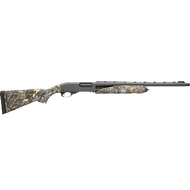The Ultimate Turkey Rig?
Posted by Larry Teague on Oct 31st 2017
(The following is an article from Buckmasters GunHunter's November 2010.)
In 1947, when gas cost 15 cents a gallon and Chuck Yeager flew the experimental X1 airplane faster than a standard-velocity .22 bullet, Remington Arms decided to replace its Model 31 shotgun. The pump-action gun had served hunters well for 16 years, but Remington thought it had an even better model in the wings. The Model 870 hit stores in 1950 and went on to become the world’s best-selling shotgun. Last year, the 10 millionth 870 came off Remington’s production line.
Dozens of variants followed the first gun, with 15 introduced in 1950 alone. In 1985, the special-purpose 870 came onto the scene. Six years later, Remington produced a shotgun just for turkey hunters. The SPS (special purpose synthetic) had a camo finish, an extra-full turkey choke and a short barrel that was less likely to snag on greenbriars or grapevines.
Other manufacturers were producing special-purpose shotguns as well. Many hunters like me, though, were happy with the smoothbores they already owned. Screw-in chokes were still relatively new, and going from a turkey gun to a quail or squirrel gun was a simple matter of changing the choke and load.
For years, my favorite “turkey gun” was a 12-gauge Browning BPS pump with a 30-inch vent-rib barrel. When I purchased the gun in the late 1970s, its special purpose was taking snow and speckle belly geese pitching into rag spreads along the upper Texas coast. For dropping speedier birds like doves and quail, I preferred the lighter, faster-swinging 20-gauge 870 I’d owned since high school. Except when hunting ducks and geese, the big 12 rarely saw daylight.
In those days, I didn’t hunt turkeys, but I became obsessed with it years later. Out came the BPS. With a full-choke tube screwed in, the tromboneaction gun was black death on longbeards. I never lost a single tom unlucky enough to walk in front of its bead.
The gun never had a hiccup and worked well with every brand of ammo I fed it. I carried it on hunts with Will Primos, Eddie Salter, Harold Knight, David Hale, Ray Eye and other turkey hunting luminaries. They, of course, had the latest short-barreled turkey model slung over their shoulders. The old warhorse is still a sentimental favorite, but these days it occupies a less prominent spot in my safe. An 870 Express Turkey Camo with an aftermarket trigger and a red-dot sight gets on birds quicker and hits them just as hard.
Unruly Jakes
The 2010 spring turkey season was tough for many west Texas hunters — not because of a scarcity of birds, but because of a surplus of them. Abundant rainfall in 2009 produced a bumper crop of poults. Young hens were plentiful, and so were immature toms, which were ganging up on longbeards responding to hunters’ calls.
When our hunting party arrived at Live Oak Lodge near Eldorado, Texas, last April, guides were frustrated. Gobblers were answering their yelps with thunderous double and triple gobbles. Jakes, however, were making it hard to seal the deal. When a half dozen jakes ran in to hector a longbeard coming into range of my gun, I was ready to ring the necks of those bully birds myself. In normal years, it’s the mature toms doing the bossing. The reverse scenario, however, proved to be a worthy test for the specialty gun and its accessories.
GunHunter contributor J. Wayne Fears, freelance writer Bob Humphrey and I joined Trijicon’s Eddie Stevenson and Timney triggers’ Chris Ellis already in camp. This was my second hunt with outfitter Steve Elmore on this property, which is in one of the top turkey hunting areas in the U.S.
TNT for Turkeys — Trijicon and Timney
Prior to the hunt, Remington sent me an 870 Express Turkey Camo in 12 gauge. I added a Picatinny base and a Trijicon RMR (Ruggedized Miniature Reflex) sight to the gun’s receiver, which is drilled and tapped for scope mounts.
Trijicon makes two versions of the RMR. I was using the RM03. It’s illuminated by fiber-optic light and tritium. No batteries are needed, and there’s nothing to fool with. The amber dot is always on and is guaranteed to stay lit for 15 years.
Trijicon bills the RMR as the most durable red-dot sight in the world. It’s also likely the smallest sight of its kind on the market, weighing just 1.2 ounces.
Anyone who watches TV news reports from Iraq and Afghanistan has seen U.S. soldiers carrying or using Trijicon optics. The full-sized, magnified ACOG (Advanced Combat Optical Gunsight) is often paired with the RMR for close-range work. Both sights acquire targets quickly and give soldiers a big advantage in low-light situations.
Before heading to the range to pattern the shotgun, I swapped its factory trigger with Timney’s 870 Trigger Fix. This was a simple task. Pushing two pins on the receiver frees the 870’s trigger assembly. Instructions on Timney’s website make the change easy.
Three interchangeable color-coded springs included with the kit determine the amount of trigger pull, which ranges from 2 to 4 pounds. Following the instructions, I chose the appropriate spring for a 4-pound pull, added the new sear also included with the kit, and verified the pull weight with a Lyman Electronic Trigger Pull gauge. The new trigger breaks like a custom bolt gun’s.
The idea for producing an adjustable trigger for the Remington 870 shotgun came from Timney’s customers, said Chris Ellis. “Two years ago, we did a survey asking hunters and shooters which trigger they would like next. They really wanted the 870 trigger. It wasn’t even close,” he said.
Before producing the 870 trigger, Timney did a lot of beta testing. “Once we got it right, we put it on the market,” Ellis added.
The 870 Trigger Fix is especially useful for shotgun deer hunters, turkey hunters and three-gun competitors.
At the range, I shot Federal’s copper- plated Magnum Turkey load in the 870 first because it has worked well for me in the past. The first three patterns were consistently low at 25 yards. Using a coin, I turned the RMR’s elevation adjustment, replaced the target and shot again. This time, 82 No. 6 pellets struck the turkey target’s head and neck zone. No. 5 shot performed best at 40 yards. I decided to hunt with No. 6 shot and carry a couple of No. 5 shells in case a longer shot was needed.
The Texas Two-Step
Shortly after arriving in camp, we checked our 870s at a range not far from the headquarters.
Fears’ and Humphrey’s guns wore Trijicon Reflex models, a larger red dot sight with a wider field of view.
Stevenson also brought his pet coyote rig, a Remington R15 with an RMR and a 3-9x40 Trijicon Accupoint scope. “A hunter can easily transition from short to long range with this setup,” he explained.
The next morning, Live Oak outfitter Steven Elmore and I watched the sun rise with dozens of birds roosting in live oak trees in front of us. The birds’ silhouettes were plainly visible against the blue-black sky.
One by one, hens flew down on the far side of the tree and walked straight away from us. The toms followed. Later that morning, a gobbler came running in before we could set up, and busted us. A second tom just off a ranch road spotted our legs through the underbrush and sounded the alarm putt.
On a different part of the property the next day, jakes ganged up on and ran off gobbler No. 3. For another hour, we watched the immature birds walk in and out of the picture, our faces getting longer by the minute.
My legs were cramping when another longbeard made an appearance without even a courtesy gobble. I had the amber dot on his wattles at 30 yards. Then for no apparent reason, he abruptly picked up the pace.
It wasn’t the most difficult shot I’ve made while turkey hunting, but it was far from ideal, with the recoil pad on my biceps and the receiver low on my face. The trigger broke crisply, without creep or overtravel, and the tom hit the dirt. Remington won’t be getting that gun back.

